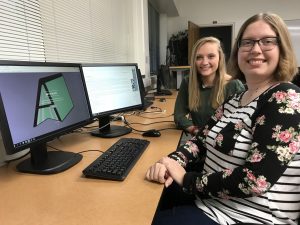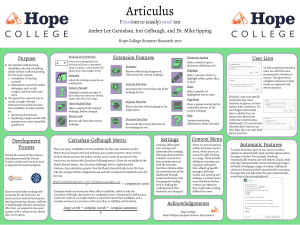A new web-based, plug-in application created by two Hope students gives those with learning disabilities the means to read online articles at a level that best suits their reading comprehension. The app, called Articulus (meaning “article” in Latin), allows for greater reading understanding and success in school and life. Senior Amber Carnahan and sophomore Jori Gelbaugh, under the supervision of Hope professor, Dr. Michael Jipping, professor of computer science, developed the program during the summer of 2017. Though currently and primarily in use at Black River School in Holland, as a Chrome extension, Articulus is also available to anyone, free, in the Google Chrome Web store.

And it all got started because of a conversation in a grocery store aisle.
“The more I thought it was a really cool thing for Hope students to do, and it could be very contributive for others, too.”
“I was in Meijer and I ran into a friend (who works with students with learning disabilities),” said Jipping. “And we were chatting and grocery shopping and he said, ‘You know what I would love. I have students who do research online and they always run into web pages that are above their reading level and it’s just so frustrating for them. What we need is a plug-in for Chrome that reduces the reading level of these web pages.’
“At first, I said, ‘Okay, thank you. That’s really hard.’ But the more I got to thinking about it, the more I thought it was a really cool thing for Hope students to do, and it could be very contributive for others, too.”
So Jipping made the project a priority for the Hope Software Institute (HSI). A software development arm of the Department of Computer Science, HSI gives experience to Hope students who are interested in pursuing careers in the software industry while delivering applications to real clients, usually a non-profit organization that could not afford a professional developer.
They wrote code in Java Script and designed the app in regard to its features, aesthetics, and usability.
Carnahan, a computer science and English double major, and Gelbaugh, a computer science and international studies double major, were hired by Jipping (yes, HSI pays its student workers!) to tackle the complex work of learning a new programming language to make the English language less complicated. Over the course of the nine-week project, they learned to write code in Java Script and determined how that code interfaced with Chrome and Chrome extensions. They also designed the app in regard to its features, aesthetics, and usability.
All of that, though, needed to precursor, a run-up to understanding how reading levels are measured and thus can be changed.
“As soon as we were hired for the summer, and before we started programming, we met with Professor Laura Pardo (of the Department of Education),” says Carnahan. “She gave us a number of reading metrics that showed us the areas in reading where people can get caught off guard. We settled on two…kind of. We worked with those for a while but in the end, we combined the two to develop our own metric… As an English major, I was excited to look at English language problems.”
Dr. Pardo also encouraged the two students to not just consider word and sentence complexity but also visual distractions that can be prevalent on web pages.
“So, we built into our app ways you can toggle images or just remove ads even before they load on the page,” adds Carnahan. “Those are some of the things we looked at as well as sentence length, synonyms options, and grammar.”
 Besides working with closely with Dr. Jipping and Dr. Pardo, Carnahan and Gelbaugh also meet with their Black River clients every two weeks to discuss the app’s progress. From prototype to the (mostly) finished project, the feedback has been positive, says Jipping. And not only from Black River. The 2017 Consortium for Computing Sciences in Colleges (CCSC) Midwest was also impressed. At their recent 2017 conference, CCCS honored Carnahan, Gelbaugh, and Jipping with the best poster award.
Besides working with closely with Dr. Jipping and Dr. Pardo, Carnahan and Gelbaugh also meet with their Black River clients every two weeks to discuss the app’s progress. From prototype to the (mostly) finished project, the feedback has been positive, says Jipping. And not only from Black River. The 2017 Consortium for Computing Sciences in Colleges (CCSC) Midwest was also impressed. At their recent 2017 conference, CCCS honored Carnahan, Gelbaugh, and Jipping with the best poster award.
“I think technology is incredibly powerful. It can be used to really build people up and improve their lives. Really, that was the best part of all of Articulus.”
Though there are some changes the group would still like to make to the app, for the most part, they are happy with what they created for both technical and humanitarian reasons. Both student developers are delighted they were able to create something that helps others in meaningful, educational ways. Their product tagline — The Freedom to (Easily) Reading ‘Em — sums up what they wanted Articulus to do best.
“This process showed me how we can meet up with people who have a problem and then make things better and in this case, it was with reading,” says Carnahan. “I hope that students can now feel better in class because they are not worrying about falling behind. They can be grasping the content without having to lose as much time.”
“For me, I have a brother who struggled with reading throughout his education,” adds Gelbaugh. “So this was a very personal project for me. I think technology is incredibly powerful. It can be used to really build people up and improve their lives. Really, that was the best part of all of Articulus.”


This sounds awesome. As a mom of a Hope freshman, I work with adult learners who have reading challenges. Do you have a date for the launch?
Laura, thank you for reading and for interest in this app. Articulus is available in the Google Chrome store but here is the link: https://chrome.google.com/webstore/detail/articulus/pndnlkihjjdbnjgoaocomnekfpbnnnlm?hl=en-US